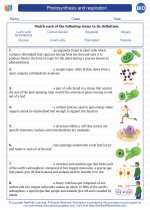Life Processes
Life processes refer to the essential activities that all living organisms carry out to maintain life. These processes are crucial for the survival, growth, and reproduction of living things.
1. Nutrition:
Nutrition involves the intake of nutrients and the utilization of these nutrients by an organism. There are two main modes of nutrition:
- Autotrophic Nutrition: This is exhibited by autotrophs, such as plants, which can synthesize their own food using sunlight, water, and carbon dioxide through the process of photosynthesis.
- Heterotrophic Nutrition: Heterotrophs, including animals and fungi, obtain their food by consuming other organisms.
2. Respiration:
Respiration is the process by which organisms obtain energy from their food. It involves the breakdown of complex organic molecules (such as glucose) to release energy in the form of ATP (adenosine triphosphate).
3. Excretion:
Excretion involves the removal of waste products produced by the metabolic activities of cells. This process helps maintain the internal environment of an organism by eliminating harmful substances.
4. Growth:
Growth refers to the increase in the size and/or number of cells in an organism. It is a fundamental characteristic of living organisms and is often accompanied by differentiation, where cells become specialized for specific functions.
5. Reproduction:
Reproduction is the process by which organisms produce offspring. It ensures the continuity of a species and can occur through sexual or asexual means.
6. Response to Stimuli:
Living organisms can respond to changes in their environment, a characteristic known as irritability or sensitivity. This enables them to adapt to environmental changes and maintain homeostasis.
Study Guide
Key Concepts:
- Understand the fundamental processes that sustain life in organisms.
- Differentiate between autotrophic and heterotrophic nutrition.
- Comprehend the significance of respiration in releasing energy for life processes.
- Recognize the importance of excretion in maintaining internal balance.
- Describe the processes of growth and reproduction.
- Explore how organisms respond to stimuli in their environment.
Study Tips:
- Create concept maps or diagrams to illustrate the interrelationships between the life processes.
- Use real-life examples to understand the application of these processes in different organisms.
- Practice by solving relevant biology problems and case studies.
- Engage in discussions or group study sessions to reinforce your understanding of the topic.
Further Reading:
- Explore the specific mechanisms of photosynthesis and cellular respiration in plants and other photosynthetic organisms.
- Investigate the excretory systems of different animals and their adaptations to diverse environments.
- Research the reproductive strategies of various organisms, including both sexual and asexual reproduction.
◂Biology Worksheets and Study Guides High School. Photosynthesis and respiration
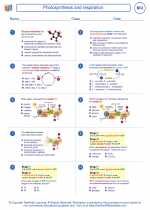
 Worksheet/Answer key
Worksheet/Answer key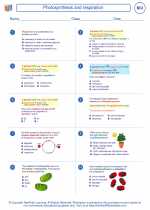
 Worksheet/Answer key
Worksheet/Answer key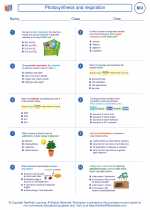
 Worksheet/Answer key
Worksheet/Answer key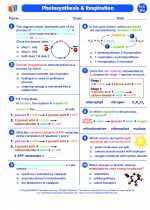
 Vocabulary/Answer key
Vocabulary/Answer key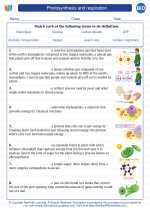
 Vocabulary/Answer key
Vocabulary/Answer key